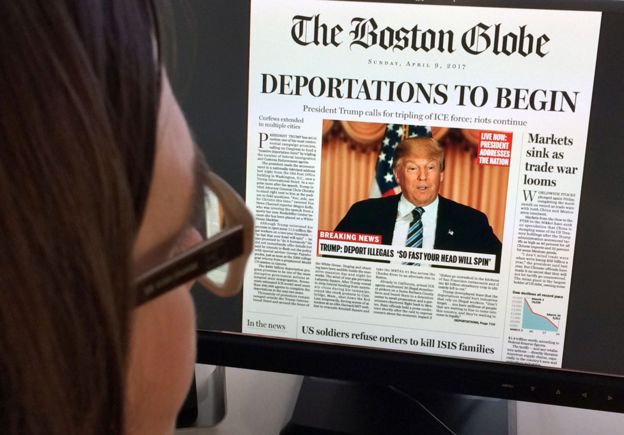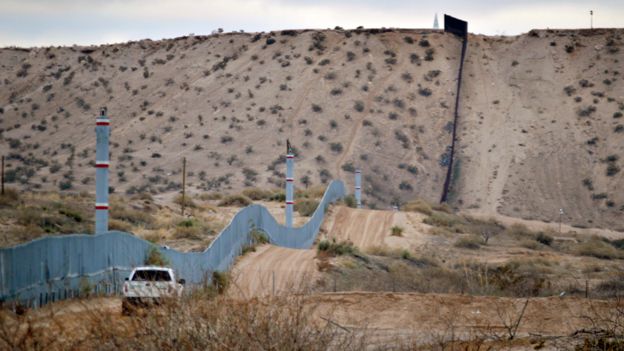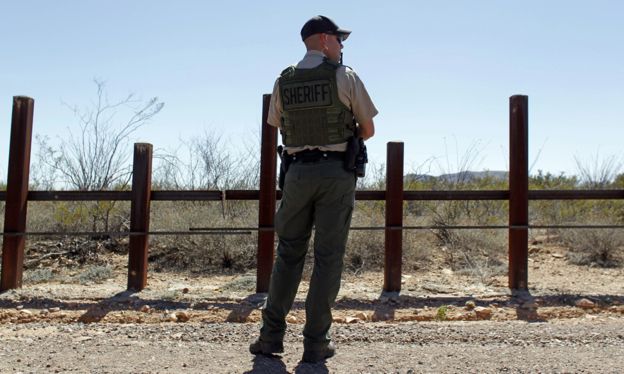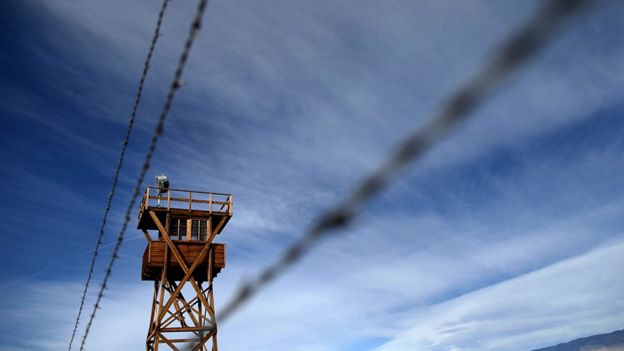Viewpoint: How would Trump remove 11 million people from the US?
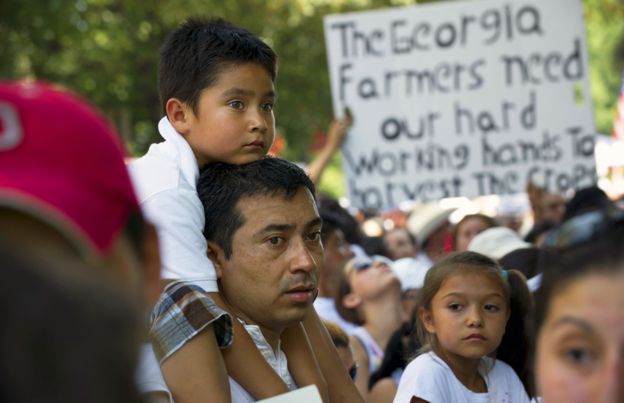
Lost in the most consistently astonishing US presidential campaign since the 1864 Democrats ran on a platform of conceding the Civil War, is a disturbing question that seems to bring into doubt the very premise of the American experiment. Exactly how would Donald Trump deport 11 million undocumented migrants from the US?
Who does and doesn't fit his perception of who belongs here was the ground zero of his campaign. The demonisation of Mexicans, the wall, the asset freeze, the elimination of birthright citizenship, much of the white-power undertone to his rhetoric — all of it mainlines back to this one premise.
And the premise came to the fore again on Thursday when, on national television, Trump told a self-declared supporter that it didn't matter if her undocumented relatives had been here for a quarter of a century, they would be deported. "I'm sure these are very, very fine people. They're going to go, and we're going to create a path where we can get them into this country legally, OK? But it has to be done legally."
A President Trump would take about 3.5% of everybody here and round them up. Move 'em on, head 'em up, cut 'em out, ride 'em in.
Sure.
For the moment, let's brush past the morality and the ethics and the economic impact, and the resultant $20 tomato and the nationwide repetition of the year Georgia expelled all its "illegals" and had nobody to harvest the crop, and $140m (£98m) of it rotted in the fields, and the sheer Sisyphean nature of the thing (so — you get them all out of here and none of them ever come back because wall, even though they might think of coming back because tunnel).
The obvious but largely unexplored question is: What if they don't want to go?
I'm suggesting — and please tread carefully as you go out on this limb with me — that 11 million people who beat extraordinary odds to come to this country because they saw a chance for a life here, might hesitate to just go back. You know, just like my great-great-grandfather Frederick stayed (sorry, I don't know where his papers are, he died in 1860) and Donald Trump's grandfather stayed (I bet you Trump doesn't have his papers either).
I know I'm positing something outlandish, almost to the point of being science fiction, but I truly believe that those who live here under constant threat of exposure and removal, doing the worst jobs, for the lowest pay, almost always outside the most minimal protections of the law and the lawmen, would not respond to a Trump administration "deportation force" like kids caught in a game of hide-and-seek. They might, you know, resist.
But let's say I'm wrong. Let's say 11 million people here do choose — in Mitt Romney's gloriously naive phrase — "self-deportation". No hesitation, no resistance, no struggle, no relatives hiding them, no documented immigrants or birthright citizens standing up for them. Just "Exit, stage right." How is Trump going to pull even that trick off?
During a debate, Governor John Kasich of Ohio expressed disbelief at the logistics and Trump replied: "I built an unbelievable company worth billions and billions of dollars. I don't have to hear from this man, believe me. I don't have to hear from him."
To date Trump has offered only two details:
He would have a "Deportation Force." But don't worry, because he adds, "You would do it humanely."
His policy website (OK, policy-under-construction page) indicates he would "triple the number of immigrations and customs enforcement agents". Well, that's dandy. Right now the three government agencies that would seem to constitute Trump's posse (US Customs and Border Protection, US Immigration and Customs Enforcement, and US Citizenship and Immigration Services) combine to employ a little fewer than 100,000 people. Even though this number includes not just actual border personnel but also the guys who keep out illegal plants and vegetables and stuff, we'll count them all as "agents." A Trump trebling gives us 300,000 "immigrations and customs enforcement agents" — to remove 11 million undocumented immigrants.
That's a ratio of 37 immigrants per agent.
If the entire expulsion process from round-up to judicial acquiescence and appeal was somehow sped up to an average of six months, and it somehow required a ratio of just one agent per immigrant, Trump's "Deportation Force" would be on pace to be able to clear them all out some time in the year 2035. If for some reason it took longer, or you kept the speed but found you needed say, three agents to give these people their parting gifts, including a home version of The Trump Entertainment Resorts Collector's Edition Monopoly Game, the process wouldn't be over until around the election of 2072.
Even if these wildly optimistic numbers turned out to wildly underestimate the American spirit to throw out the newest arrivals in fear that they somehow endanger the penultimate arrivals, the absolute best-case scenario still stretches out over a decade. ICE (an acronym for Immigrations and Customs Enforcement — a name almost as bad as Homeland Security) claims it could deport 400,000 undocumented immigrants a year. Apply Trump's triple formula not just to the staffing but to the results and it's still 2027 before the last of them is gone, and again this presumes nobody puts up a fight, nobody tries to come back, and nobody new tries to get in.
So what do you do with all of them between now and 2027, 2035, or 2072? You'd need to keep them somewhere.
I mean, physically, you can't throw 11 million people out of the country at the same time. Especially if there's a wall there. 11 million is a little less than the population of Ohio. "OK, Ohio, everybody out of the pool!" doesn't work.
You'd need to keep them somewhere.
Camps.
Detention camps.
Processing camps.
Perhaps 10 huge camps, each big enough to house the population of Dallas. Or 20 smaller camps, including one for the estimated 500,000 undocumented workers in New York City alone — a population larger than that of the New York borough of Staten Island.
And around the beds, hurricane fences, barbed wire, guard towers, detainees arriving via train in some empty corner of Wyoming — all the dystopian details we've seen unfolding at the refugee/migrant camps in Calais and Greece and throughout Europe — would be a particularly American touch: a lovely redux of the imagery of World War Two Japanese internment — or worse.
To a lot of Trump's fans these would be positive boons but a year ago, analysing the insanity of trying to throw out 11 million people and concluding it would cost $400-$600bn (£280-£420bn) and shave $1.6 trillion (£1.1tn) off real GDP, the president of a conservative think tank called American Action Forum underscored the optics to the magazine The Atlantic:
"It still would be, I think, a shocking sight to the American people, to have the detentions, the deportations, the detention centres, the need for the administrative end of this," said its president Douglas Holtz-Eakin. "If you were to do it faster and have vans sweeping in, I think that would have the untenable feel of the police state to the American people."
And that's with at least some cooperation from the people Trump would be expelling. We aren't even looking at the answers here that involve prosecuting Americans "guilty" of hiding their friends, lovers, relatives, neighbours, and strangers in their attics, or the raids by Trump deportation squads, or documented residents swept up in the madness, or suicides at detention camps the size of army bases, or the bodies of the undocumented dead in the street because a lot of people would rather die than go back, or what happens when somebody fights back.
So, that's how Donald Trump would deport 11 million people from this country. But don't worry, he promises, "You would do it humanely."
If you have any other questions about the details, ask Trump himself. I'll wager he'll tell you he has the right to ignore you because he makes more money than you do.
Политика конфиденциальности | Правила пользования сайтом

